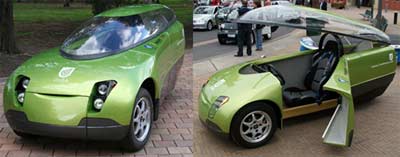Staff and students at the University of South Australia have designed and built an amazing vehicle called the Trev. Its features include:
* two comfortable seats, since more than 90% of urban trips have only one or two people in the car;
* enough luggage space for at least two overnight bags;
* 300 kg mass—because using a 2.5 tonne vehicle for commuting is ridiculous;
* energy-efficient tyres, brakes and suspension;
* a clean, quiet and efficient electric drive system;
* compliance with road safety and worthiness regulations;
* good performance, with a top speed of 120 km/h; and
* 150 km of city driving before the car must be recharged.
Most importantly, it uses less than 1/5 of the energy required by a conventional car, and can be recharged using electricity from clean, renewable sources such as solar and wind.
And it doesn't look too bad...
Features
* The tandem seating layout gives good aerodynamics, good balance, and good vision.
* The acrylic canopy gives the driver an unimpeded view of the road.
* The canopy and door open on the kerb side of the car.
* The electric motor gives smooth, quiet acceleration from 0–100 km/h in under 10 seconds.
* A composite tub chassis, with foam and plastic body panels, gives a total car mass of 300 kg.
* A 45 kg lithium ion polymer battery gives over 150km of city driving.
* Low-energy tyres on low-mass alloy wheels give low rolling resistance.
* The single rear drive wheel simplifies the suspension, and allows a simple, efficient transmission.
Performance
In October 2007 they drove Trev from Darwin to Adelaide in the Greenfleet Technology Class of the World Solar Challenge. For most of the journey, we drove 80 - 120 km at speeds of 80 - 90 km/h before stopping to recharge from a generator. We completed the 3020 km trip in just over 6 days.
Our energy consumption was 6.2 kWh/100 km. Recharged from solar, wind or hydro, there are no emissions.
Electricity costs about $0.18 per kWh. The cost of recharging Trev is 2¢ cents per mile, so the entire journey cost us $33 of electricity

